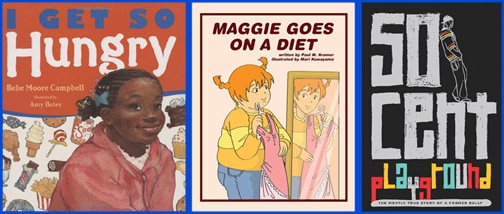
Playground: The Mostly True Story of a Former Bully was written by the musician 50 Cent for young adults (age 12+). The protagonist, Butterball, is definitely a bully, although he is at the same time a 13-year-old fat kid.
Los Angeles Times reporter Susan Carpenter says,
So called because of his weight, Butterball is a seventh-grader whose parents split up a couple of years earlier, forcing him to divide his time between his dad’s place in New York and his mom’s apartment in the Long Island suburb where he goes to junior high.
Butterball’s mother works and goes to school, and that’s what the women’s movement was all about. Now, it’s a statistical fact that the children of working mothers tend to be obese. And some people who are concerned about the childhood obesity epidemic throw a lot of blame on working mothers for being neglectful. But it isn’t the fault of the women’s movement.
Things didn’t turn out as planned. Hopeful feminists expected men to stand behind mothers who work or go to school, and take up some of the slack. Which has not happened in every family. For instance, Butterball’s father is present, but preoccupied with his girlfriends rather than with keeping things afloat on the home front.
The purpose of this book is to enable kids who engage in bullying to “move past it,” and Carpenter seems optimistic about that, saying,
Part of the solution to any epidemic is understanding it. And in that regard, 50 Cent is doing a great service to readers by leveraging his from-the-streets credibility and experience as a bully to explore how it can happen… Butterball’s therapy offers insight into a behavior that few bullies, or their victims, understand. And it shows a path forward that is proactive and redemptive.
I Get So Hungry, by Bebe Moore Campbell, is written for children from kindergarten age to third grade, who struggle with overeating and are either obese or headed in that direction.
Charleston Daily Mail staff writer Zack Harold offers this description:
The main character is Nikki, an overweight elementary school student who eats when she’s upset. Her teacher, Mrs. Patterson, also is overweight but begins to lose pounds after an obesity-related hospital stay. Mrs. Patterson encourages Nikki to break her bad eating habits, too, and get more exercise. Nikki’s mom is initially reluctant about her daughter’s lifestyle changes but eventually starts eating and exercising, too.
For a book that apparently isn’t even available yet, Maggie Goes on a Diet has gleaned a mountain of publicity. It’s about an overweight, insecure 14-year-old who turns her life around. And it’s written in rhyme, so technically it’s more of a poem than a novel. One problem is, some people don’t agree with the age group it has been labeled as appropriate for.
Some have threatened to boycott Amazon.com if the online bookstore dares to carry the book. Others refute the idea that healthy eating and exercise are the entire answer to childhood obesity.
Part of the problem might be semantic, as some people see red the moment they hear the word “diet.” But everyone has a diet. Your diet is what you eat, whether it’s a handful of chestnuts or an entire roast boar. There should be another word the means “reducing diet.” Which is a whole different thing.
For the Los Angeles Times, Karen Kaplan wrote,
Apparently, ‘diet’ is one of the most incendiary four-letter words in the English language… Many online critics have also pointed out that the author and self-publisher, Paul M. Kramer, has no expertise in child health (and isn’t exactly slim himself).
Experts don’t seem to be doing such a fabulous job of stemming the childhood obesity epidemic, so why shouldn’t Kramer have a go at it? With all due respect to people with degrees, it would be fair to say that credential-worship isn’t smart, and too much reliance on credentials has caused a lot of problems in the world.
That crack about Kramer being not exactly slim: the ancient Romans called this an argumentum ad hominem, and its weaknesses have been known for thousands of years. While it is unfortunate that many health professionals and other advice-givers have weight issues of their own, so what? They can be good advisors without necessarily being good role models. Whatever an author’s size might be, that would not disqualify him or her from writing competently and with insight about childhood obesity or any other topic.
Here’s another opinion: Dr. Keith Ablow, a psychiatrist, wrote on the obesity topic:
I support Kramer’s book… While it could be theorized that some children and adolescents who are vulnerable to over-dieting could gravitate toward Maggie Goes on a Diet, I don’t think the book is going to push them over the edge… In fact, in a society like ours, which contaminates childhood with falsehoods and fictions about nearly everything, Maggie is a welcome truth-seeker.
Your responses and feedback are welcome!
Source: “Not Just for Kids: ‘Playground: The Mostly True Story of a Former Bully’ by 50 Cent,” Los Angeles Times, 10/30/11
Source: “Library offers unconventional kids’ books ,” Charleston Daily Mail, 11/09/11
Source: “‘Maggie Goes on a Diet’ the sensible way in children’s book,” Los Angeles Times, 08/23/11
Source: “Psychiatrist Supports Controversial Diet Book for Kids,” FoxNews.com, 08/23/11
Images of Maggie Goes on a Diet, Playground, and I Get So Hungry book covers are used under Fair Use: Reporting.

 FAQs and Media Requests:
FAQs and Media Requests: 











